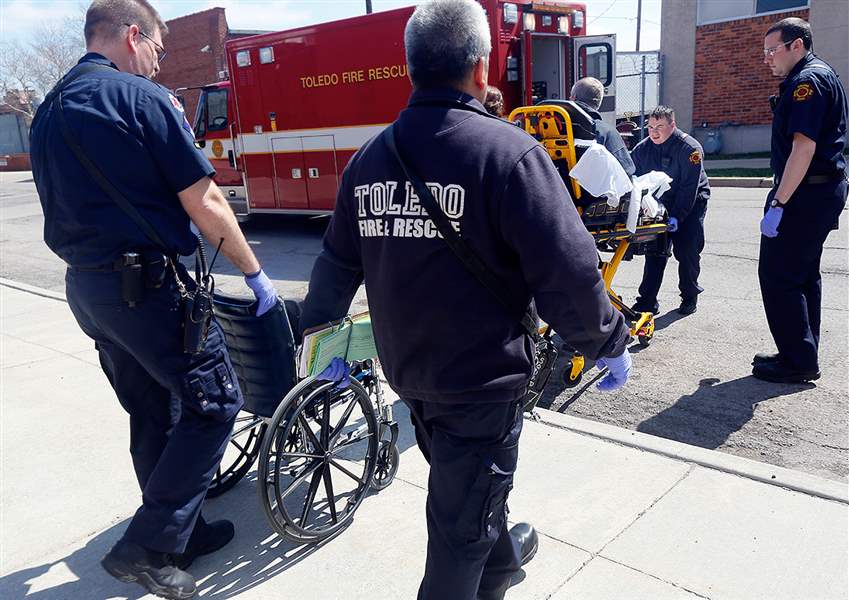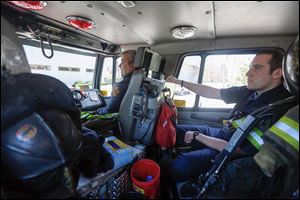
FRATERNITY OF HONOR | THE CHANGING NATURE OF THE FIRE SERVICE
The hidden city
5/26/2014
Toledo Fire and Rescue workers, from left, Glenn Hill, Tony Salazar, Chad Bowman, and Barrett Dorner, load a patient into the ambulance after receiving a medical emergency call from him.
THE BLADE/AMY E. VOIGT
Buy This Image

Tony Salazar, left, and Barrett Dorner, from Toledo Fire Station 7, talk about their medical run on their way back to the station.
Some people are simply wired differently than the rest of us. And they gravitate to different professions because of it. Poets are wired differently. Politicians certainly are. Fighter pilots, surgeons, composers are all wired differently.
So too are firefighters. They run toward danger. Most of us run away.
RELATED CONTENT: Click here to read part 1 of this series
Most of us, if we somehow found ourselves firefighters, would want to be in a nice quiet station in the suburbs. Firefighters want the opposite — to be in one of the busiest stations. And that means, the central city — where there is the highest concentration of poverty, crime, illness without regular medical attention, injury, fear, and bloodshed.

Much of what Toledo Fire and Rescue does today is rescue. Here is a little of what I saw on a day, and then a night, with the men and women of Fire House 7 in the Old West End in Toledo:
I saw an old lady motionless on the floor in a dim and grim apartment in the projects. She didn’t move. I heard her faint voice, but never saw her face. Her voice was not one of fear, but weariness and resignation. While the EMTs attended to her, her home health care worker, presumably there when the old lady rolled or fell out of bed, took furtive bites of a fast-food cheeseburger. There was no wall decoration anywhere in the apartment, not a picture of family, or a calendar, or a Madonna and Child. Nothing, save for one small framed, but unglassed word. The word was “home.”
Firefighters stabilized her and took her to the hospital.
I saw a woman in a tall downtown office building. She might have been having a heart attack. I learned from the firefighters that heart attacks in women are not so easy to detect. Or she might have been having an anxiety attack. It turned out it was the latter. She kept saying she was sorry and embarrassed. She said she had a lot going on in her life right now. The firefighters told her there was nothing to be sorry or embarrassed about. They did an EKG on her in the company cafeteria, where we found her. Like the first lady, she was eventually put on a stretcher to the hospital. And, as with the first case, human indifference briefly appeared on the margins of the room. While three firefighters attended to her, and later the ambulance crew, a fellow worker sat four feet away drinking coffee and reading Cosmopolitan magazine.
I saw a man’s arm gushing blood. A lot of blood. He was frightened. He was in tremendous pain. He kept saying to the EMTs “come on man.” His family members were trying to calm him. The whole scene was disconcerting. It was dark and as we approached we saw a huddle of people and someone holding something small. At first, we all thought it was a child — the thing veteran firefighters dread as much as this naive observer. But no, it was this man’s head. His body was limp. His friends and family were cradling his head, trying to steady his nerves. He said he was grilling chicken and fell on the sharp end of a glass table. The firefighters didn’t question that. They bound up his wound and gave him oxygen and an IV to get fluid back into him. They tried to hold him still and avoid being spattered with blood. I held the flashlight. Everyone was relieved when the ambulance arrived.
Later in the night, much later, we went to the aid of a man who had gashed his head on a stone in front of his friend’s house. He stayed with her sometimes, she said. The cut was deep, though there was not as much blood as in the earlier call. “I split my dome,” he said several times. His friend was yelling at him repeatedly to cooperate. She said he’d been drinking “a little.” She later amended this to “an awful lot.” She told him we were not the police. All this took place on a porch. It was cold. The man had on only a T-shirt and sweat pants. He looked to weigh maybe 90 pounds. He was hysterical, though he mostly spoke in animal sounds, not words. The challenge was to keep the man calm. His friend went to her car for heat, and to wait there for the ambulance. I think this man thought he was dying and I think, despite his pain and panic, he was resigned to the prospect.
We went to a house in a very poor neighborhood. Little children peered out the front window of a ramshackle building. The adults in the house called them “the babies.” Someone had doused gasoline on the back of their house. Lt. Brian Henry smelled it immediately. So did his crew. Not me. The people in this house were the only whites in the neighborhood. The lieutenant asked if they had “anything going on” with their neighbors. They said no. Two police officers came. "What the .... are we supposed to do about it?" asked one cop. Fire and police agreed to keep an eye on this place. “They need to get out. I’d get out tonight” one firefighter muttered to me as we climbed back aboard the rig.
We met a lady in bed — just a bed in just one room. Wrong pill combo. Serious. Not critical. Again, no art on the walls, save two things: A painting of a once sumptuous woman in a bed, a woman I took to be this woman.
We were called to a home the firefighters assessed as an absolute firetrap — rotten wood, blocked doors, multiple entrances, some nailed shut. “I hope we are not back here soon,” said one firefighter. It was hard to tell who was living in this house, who was just visiting, or how they each related to each other. Voices and TV sounds came from various rooms and overlapped, while men commanded timid and bowed women to "Shut the ....... door.“ There was no light anywhere.
We met a young woman with a 3-month-old baby who was wheezing. She’d given him a bath to warm and soothe him. She was a first-time mom and just wanted to know he was OK. The men took his vitals and reassured her.
Much of this happened well after midnight.
Responding to a “regular” (someone who calls 911 weekly if not daily) at 2 a.m., I see a guy running down the street. Fast. He ducks into the apartment below the regular’s and I hear the locks and bolts slide quickly shut. I wonder what his story is.
A few days after my second ride, a guy in a truck ran into a downtown building and half collapsed it. He then drove on down the street on his tire rims, his tires having been incinerated, and hit another truck. “You should have been here for that one,” the guys tell me at the kitchen table.
I saw and heard some funny stuff. A computer printed sign on a woman’s door, for example, that read: “Please, someone tell me again, why do I need a man?” Firefighters do not judge. They laugh. A guy called 911 for back pain. He was in real pain, they said — which he attributed to robust sexual activity. “What should I do,” he asked. “Take a Motrin and rest for a while,” they said. Firefighters observe. Tell stories. But they don’t judge.
I laugh, a different sort of laugh, when people tell me about “rich” or “lazy” firemen.
People have no idea. These guys not only do heroic work, fighting fires, but missionary work — Mother Teresa, Jane Addams work. They take care of the lost and wounded and addicted souls among us. Most people would not go near these needy folk or the places they live. Toledo Fire and Rescue deals with the wretched of the earth — right here among us, in housing that is worse than much in the Third World, in neighborhoods invisible to all of us.
These neighborhoods are so buried within the city that you can’t find them again. None of us would live there. We’d raise holy hell if we had to. We’d make a federal case of it. Lieutenant Henry told me about a boy with an ear ache. He pulled a cockroach out of the child’s ear.
We went on one call where they didn’t want us. It was in the north end. A young punk had hit his girlfriend and fled on foot. We were advised that there was no gun. The girl seemed to be mostly OK. But she was pregnant, so she had to be checked out. She was living in a shelter, and just visiting her mother’s house when she was assaulted. The EMTs tried to evaluate her. But her mother was not OK, and not OK with firefighters. She wanted an ambulance for her daughter. And she wanted it now. And she did not want firemen, or questions, or procedures. “You all fight fires,” she said “What do you know about medicine? Just get out of here. Just go and get. Right now.” She said she wanted the ambulance and the paramedics, who arrived presently — from Toledo Fire and Rescue.
Toledo Fire and Rescue treats the wounded and the sick in the hidden, forgotten city — with patience. Infinite patience and practical compassion.
On Tuesday: Who are these guys? Why do they do it?
Keith C. Burris is a columnist for The Blade.
Contact him at:kburris@theblade.com or 419-724-6266.